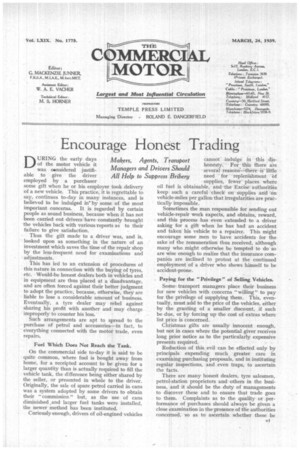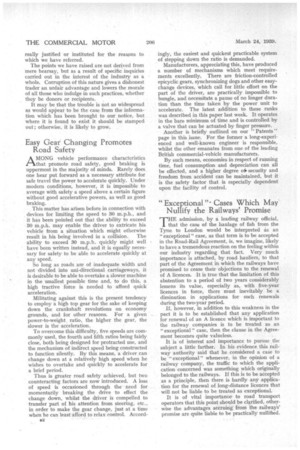Encourage Honest Trading
Page 27

Page 28

If you've noticed an error in this article please click here to report it so we can fix it.
DURING the early days of the motor vehicle it was oensidered justifiable to give the driver employed by a purchaser some gift when he or his employer took delivery of a new vehicle. This practice, it is regrettable to say, continues to-day in many instances, and is believed to be indulged in" by some of the most important concerns. It is regarded by certain people as sound business, because when it has not been carried out drivers have constantly brought the vehicles back with various reports as to their failure to give satisfaction.
• Thus the gift made to a driver was, and is, looked upon as something in the nature of an investment which saves the time of the repair shop by the less-frequent need for examinations and adjustments.
This has led to an extension of procedures of this nature in connection with the buying of tyres, etc. Would-be honest dealers both in vehicles and in equipment are thus placed at a disadvantage, and are often forced against their better judgment to adopt the practice, because, otherwise, they are liable to lose a considerable amount of business. Eventually, a tyre dealer may rebel against sharing his profit with another and may charge improperly to counter his loss.
Such arrangements are apt to spread to the purchase of petrol and accessories—in fact, to everything connected with the motor trade, even repairs.
Fuel Which Does Not Reach the Tank.
On the commercial side to-day it is said to be quite common, where fuel is bought away from home, for a receipted account to be given for a larger quantity than is actually required to fill the vehicle tank, the difference being either shared by the seller, or presented in whole to the driver. Originally, the sale of spare petrol carried in cans was a system adopted by some drivers to obtain their " commission " but, as the use of cans diminished and larger fuel tanks were installed, the newer method has been instituted.
Curiously enough, drivers Of oil-engined vehicles cannot .indulge in this dishonesty. For this there are several reasons‘—there is" little need for replenishment of supplies, fewer' places where oil fuel is obtainable, and -the Excise authorities keep such a careful check on supplies arid :on vehicle-miles per gallon that irregularities are practically impossible.
Sometimes the man responsible for sending out vehicle-repair work expects, and obtains, reward, and this process has even extended to a driver asking for a gift when he has had an accident and taken his vehicle to a repairer. This might encourage some men to have accidents for the sake of the remuneration thus received, although many who might otherwise be tempted to do so are wise enough to realize that the insurance companies are inclined to protest at the continued employment of a driver who shows himself to be accident-prone.
Paying for the "Privilege" of Selling Vehicles.
Some, transport managers place their business for new vehicles with concerns " willing " to pay for the privilege of supplying them. This, eventually, must add to the price of the vehicles, either by the granting of a smaller discount, if such be due, or by forcing up the cost of extras where list price is concerned.
Christmas gifts are usually innocent enough, but not in cases where the potential giver receives long prior notice as to the particularly expensive presents required.
Reduction of this evil can be effected only by principals expending much greater care in examining purchasing proposals, and in instituting regular inspections, and even traps, to ascertain the facts.
There are many honest dealers, tyre salesmen, petrol-station proprietors and others in the business, and it should be the duty of managements to discover these and to ensure that trade goes to them. Complaints as to the quality or performance of purchases should always be given a close examination in the presenceof the authorities concerned, so as to ascertain whether these be really justified or instituted for the reas,ons to which we have referred.
The points we have raised are not derived from mere hearsay, but as a result of specific inquiries carried out in the interest of the industry as a whole. Corruption of this nature gives a dishonest trader an unfair advantage and lowers the morale of all those who indulge in such practices, whether they be donors or recipients.
It may be that the trouble is not so widespread as would appear to be the case from the information which has been brought to our notice, but where it is found to exist it should be stamped out ; otherwise, it is likely to grow.
Easy Gear Changing Promotes Road Safety
A MONG vehicle performance characteristics ..that promote road safety, good braking is uppermost in the majority of minds. Rarely does one hear put forward as a necessary attribute for safe travel the power to accelerate quickly. Under modern conditions, however, it is impossible to average with safety a speed above a certain figure without good accelerative powers, as well as good braking.
This matter has arisen before in connection with devices for limiting the speed to 30 m.p.h., and it has been pointed out that the ability to exceed 30 m.p.h. may enable the driver to extricate his vehicle from a situation which might otherwise result in his being involved in a collision. The ability to exceed 30 m.p.h. quickly might well have been written instead, and it is equally necessary for safety to be able to accelerate quickly at any speed.
So long as roads are of inadequate width and not divided into uni-directional carriageways, it is desirable to be able to overtake a slower machine in the smallest possible time and, to do this, a high tractive force is needed to afford quick acceleration.
Militating against this is the present tendency to employ a high top gear for the sake of keeping down the crankshaft revolutions on economy grounds, and for other reasons. For a given power-to-weight ratio, the higher the gear, the slower is the acceleration.
To overcome this difficulty, five speeds are commonly used, the fourth and fifth ratios being fairly close, both being designed for protracted use, and the mechanism of indirect speed being constructed to function silently. By this means, a driver can change down at a relatively high speed when he wishes to overtake and quickly to accelerate for a brief period.
Thus is greater road safety achieved, but two counteracting factors are now introduced. A loss of speed is occasioned through the need for momentarily breaking the drive •to effect the change down, whilst the driver is compelled to transfer part of his attention from steering, etc., in order to make the gear change, just at a time when he can least afford to relax control. Accord ingly, the easiest and quickest practicable system of stepping down the ratio is demanded.
Manufacturers, appreciating this, have produced a number of mechanisms which meet requirements excellently. There are friction-controlled epicyclic gears, synchronizing dogs and other easychange devices, which call for little effort on the part of the driver, are practically impossible to bungle, and necessitate a pause of no longer duration than the time taken by the power unit to accelerate. The latest addition to these ranks was described in this paper last week. It operates in the bare minimum of time and is controlled by a valve that can be actuated by finger pressure.
Another is briefly outlined on our " Patents " page in this issue. For the former a long-experienced and well-known engineer is responsible, whilst the other emanates from one of the leading British commercial-vehicle manufacturers.
By such means, economies in respect of running time, fuel consumption and depreciation can all be effected, and a higher degree of. security and freedom from accident can be maintained, but it is the safety factor that is especially dependent upon the facility of control.
"Exceptional "Cases Which May Nullify the Railways' Promise
PE admission, by a leading railway official, lat the case of the haulage of fish from the Tyne to London would be interpreted as an "exceptional" case, as that term is to be accepted in the Road-Rail Agreement, is, we imagine, likely to have a tremendous reaction on the feeling within our industry regarding that fact. Very much importance is attached, by road hauliers, to that part of the Agreement in which the railways have promised to cease their objections to the renewal of A licences. It is true that the limitation of this abstention to a period of two years considerably lessens its value, especially as, with five-year licences in force, there must inevitably be a diminution in applications for such renewals during the two-year period.
If, however, in addition to this weakness in the pact it is to be established that any application for renewal of an A licence which is important to the railway companies is to be treated as an "exceptional" case, then the clause in the Agreement becomes quite valueless.
It is of interest and importance to pursue the subject a little farther. In his evidence this railway authority said that he considered a case to be "exceptional" whenever, in the opinion of a railway company, the traffic to which the application concerned was something which originally belonged to the railways. If this is to be accepted as a principle, then there is hardly any application for the renewal of long-distance licences that will not be liable to be treated as exceptional.
It is of vital importance i to road transport operators that this point should be clarified, otherwise the advantages accruing from the railways' promise are quite liable to be practically nullified.




















































































